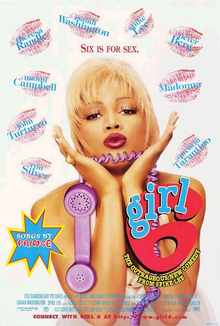
Girl 6 is a 1996 American black comedy film produced and directed by Spike Lee. The film stars Theresa Randle, Isaiah Washington, and Lee. Suzan-Lori Parks wrote the screenplay, making it the first film directed by Lee that he did not also write. Directors Quentin Tarantino and Ron Silver make cameo appearances as film directors at a pair of auditions.
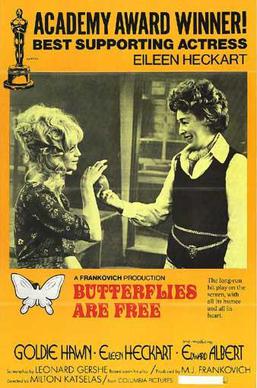
Butterflies Are Free is a 1972 American comedy-drama film based on the 1969 play by Leonard Gershe. The 1972 film was produced by M. J. Frankovich, released by Columbia Pictures, directed by Milton Katselas and adapted for the screen by Gershe. It was released on July 6, 1972, in the U.S. The film is about a woman, Jill Tanner, who moves into an apartment beside a blind man, Don Baker, who recently moved out independently. The two become attracted to each other and combine the divided apartment into one, but Don's mother tries to end the romance, fearing that Jill will break her son's heart.

The Mudge Boy is a 2003 American drama film directed by Michael Burke, based on Burke's 1998 short film Fishbelly White which was featured in the compilation Boys Life 5. It stars Emile Hirsch, Tom Guiry, and Richard Jenkins. It was produced by Elizabeth W. Alexander and distributed by Showtime after its release at the 2003 Sundance Film Festival.
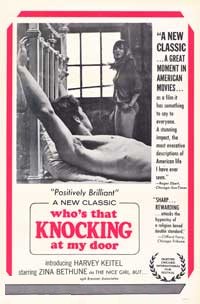
Who's That Knocking at My Door, originally titled I Call First, is a 1967 American independent drama film written and directed by Martin Scorsese, and starring Harvey Keitel and Zina Bethune. It was Scorsese's feature film directorial debut and Keitel's debut as an actor. The story follows Italian-American J.R. (Keitel) as he struggles to accept the secret hidden by his independent and free-spirited girlfriend (Bethune).
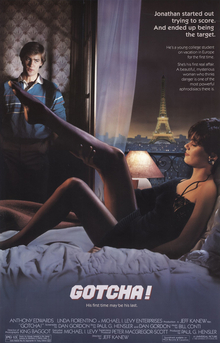
Gotcha! is a 1985 American spy action comedy film, starring Anthony Edwards and Linda Fiorentino and directed by Jeff Kanew, who also directed Edwards in Revenge of the Nerds (1984).

Alex Christophe Dupont, best known as Leos Carax, is a French film director, critic and writer. Carax is noted for his poetic style and his tortured depictions of love. His first major work was Boy Meets Girl (1984), and his notable works include Les Amants du Pont-Neuf (1991), Pola X (1999), Holy Motors (2012) and Annette (2021). For the last, he won the Cannes Film Festival Award for Best Director at the 2021 Cannes Film Festival. His professional name is an anagram of his real name, 'Alex', and 'Oscar'.

Les Amants du Pont-Neuf is a 1991 French romantic drama film directed by Leos Carax, starring Juliette Binoche and Denis Lavant. The film follows a love story between two young vagrants: Alex, a would-be circus performer addicted to alcohol and sedatives, and Michèle, a painter with a disease that is slowly turning her blind. The streets, skies and waterways of Paris are used as a backdrop for the story in a series of set-pieces set during the French Bicentennial celebrations in 1989.

Bad Influence is a 1990 American psychological thriller film directed by Curtis Hanson starring Rob Lowe and James Spader. In this noirish film, Spader plays a yuppie who meets a mysterious stranger (Lowe) who encourages him to explore his dark side. Bad Influence was the first original screenplay for which David Koepp received a sole screenplay credit.
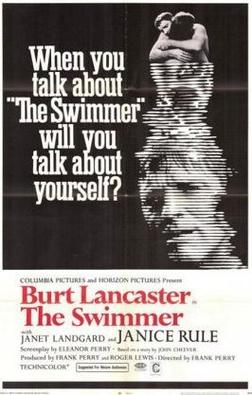
The Swimmer is a 1968 American surrealist-drama film starring Burt Lancaster. The film was written and directed by Academy Award-nominated husband-and-wife team of Eleanor Perry and Frank Perry (director). The story is based on the 1964 short story "The Swimmer" by John Cheever, which appeared in the July 18, 1964, issue of The New Yorker. The 95-minute movie adds new characters and scenes consistent with those in the original 12-page short story.

Sundays and Cybèle is a 1962 French drama film in Franscope, directed by Serge Bourguignon. Its original French title is Cybèle ou Les dimanches de Ville d'Avray, referring to the Ville-d'Avray suburb of Paris. The film tells the tragic story of a neglected young girl who is befriended by an innocent, but psychologically damaged, veteran of the French Indochina War. Bourguignon wrote the screenplay with Antoine Tudal, and he and Bernard Eschasseriaux, the author of the novel upon which the film is based, are credited with the dialogue.

Mauvais Sang, also known as The Night Is Young, is Leos Carax's second film. Released in 1986, the film played at the 37th Berlin International Film Festival before being nominated for three César Awards and winning the Prix Louis-Delluc. The film sold 504,803 tickets in France. The title refers to Arthur Rimbaud's poem in A Season in Hell.
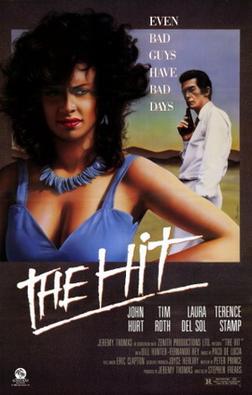
The Hit is a 1984 British road crime film directed by Stephen Frears, and starring John Hurt, Terence Stamp, Laura del Sol and Tim Roth in his film debut. It was Stamp's first starring role in over a decade, and Roth won an Evening Standard Award for Most Promising Newcomer. The title music is provided by Eric Clapton and Roger Waters. Spanish flamenco guitarist Paco de Lucia performed the soundtrack music. The film was released by The Criterion Collection on DVD in April 2009 and on Blu-ray in October 2020.
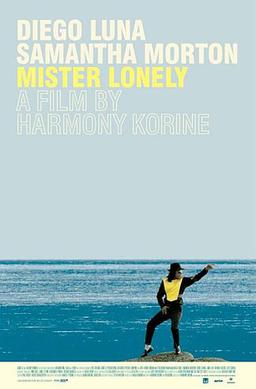
Mister Lonely is a 2007 comedy drama film directed by Harmony Korine and co-written with his brother Avi Korine. It features an ensemble cast of international actors, including Diego Luna, Samantha Morton, Denis Lavant, Werner Herzog, James Fox, Anita Pallenberg and Leos Carax. The film follows a Michael Jackson look-alike joining a commune filled with other impersonators as they build a stage to attract people to see them perform. Mister Lonely garnered mixed reviews from critics and was a box-office bomb, grossing $393,813 against an $8.2 million budget.
Mireille Perrier is a French actress and stage director.
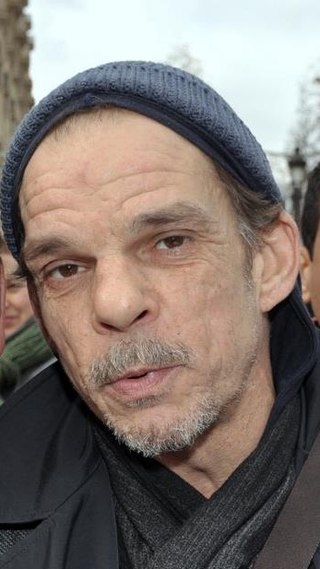
Denis Lavant is a French actor. He is known for his distinctive face and the physically demanding aspects of the roles he plays, which often involve slapstick, acrobatics or dance, as well as for his long-standing association with director Leos Carax. Lavant has played the lead role in all but two of Carax's films. Lavant is also known for his roles in Claire Denis' Beau Travail, and Harmony Korine's Mister Lonely.

Unfaithfully Yours is a 1984 American romantic comedy film directed by Howard Zieff, starring Dudley Moore and Nastassja Kinski and featuring Armand Assante and Albert Brooks. The screenplay was written by Valerie Curtin, Barry Levinson, and Robert Klane based on Preston Sturges' screenplay for the 1948 film of the same name. The original music score is by Bill Conti and the song "Unfaithfully Yours " was written for the film and performed by Stephen Bishop.

Tokyo! is a 2008 anthology film containing three segments written by three non-Japanese directors and filmed in Tokyo, Japan. Michel Gondry directed "Interior Design," Leos Carax, "Merde," and Bong Joon-ho's "Shaking Tokyo."

Thieves is a 1996 French drama film directed by André Téchiné, starring Daniel Auteuil, Catherine Deneuve and Laurence Côte. The plot follows a cynical police officer, who comes from a family of thieves, and a lonely philosophy professor, both romantically involved with a self-destructive petty criminal. With a puzzling structure, the story is told through a series of flashbacks presented from four different perspectives.

Holy Motors is a 2012 surrealist fantasy drama film written and directed by Leos Carax and starring Denis Lavant and Édith Scob. Lavant plays Mr. Oscar, a man who appears to have a job as an actor, as he is seen dressing up in different costumes and performing various roles in several locations around Paris over the course of a day, though no cameras or audiences are ever seen around him. The film competed for the Palme d'Or at the 2012 Cannes Film Festival.
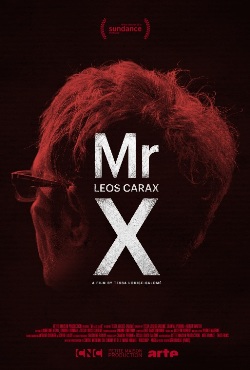
Mr Leos caraX is a 2014 French documentary film written, directed and produced by Tessa Louise-Salomé. The film premiered in-competition in the World Cinema Documentary Competition at 2014 Sundance Film Festival on January 20, 2014.



















